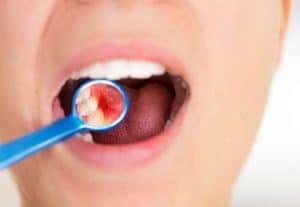 While the main goal of preventive dental care is to avoid the development of common dental issues (like gum disease), that doesn’t mean your efforts should end if one does develop. For example, having gingivitis, which is the first stage of gum disease, doesn’t mean you’ve already lost your battle against gum disease. In fact, by treating gingivitis as early as possible, you have a good chance of allowing the condition to have any significant impact on your long-term oral health.
While the main goal of preventive dental care is to avoid the development of common dental issues (like gum disease), that doesn’t mean your efforts should end if one does develop. For example, having gingivitis, which is the first stage of gum disease, doesn’t mean you’ve already lost your battle against gum disease. In fact, by treating gingivitis as early as possible, you have a good chance of allowing the condition to have any significant impact on your long-term oral health.
What gingivitis means long-term
Gingivitis is the common name for the infection that oral bacteria cause in your gum tissues. This occurs when certain types of oral bacteria are given the chance to work their way underneath your gums, where they settle on the surfaces of your teeth roots. From underneath your gum tissues, these bacteria release harmful toxins and substances that irritate and infect your gums. Some can even cause rampant inflammation throughout the tissues, leading to increasingly worse damage. It doesn’t take long for this infection to progress into more severe gum disease, which could lead to exponentially worse damage to your smile’s supportive structures.
When gingivitis starts to get worse
The biggest danger behind gingivitis development is the fact that, at a certain point, it will no longer be reversible, and your smile will always be threatened by the disease’s progression. Fortunately, addressing gingivitis before it starts to get worse can help you manage the disease effectively, and protect the rest of your oral health from being impacted by it. If it isn’t treated promptly, the progression of gum disease can systematically destroy the periodontal (gum) tissues surrounding and protecting certain teeth. More severe forms of the disease can also erode the jawbone structure around them, leading to tooth loss or the need for tooth extraction.
The extreme consequences of severe gum disease
Because of the damage that gum disease can cause, and because the symptoms are not always obvious until it’s already severe, gum disease is the most common cause behind adult tooth loss. When it reaches that level of severity, the damage to your gums and jawbone in a certain area of your dental ridge can make it impossible for these structures to retain their hold on your teeth in that area. Also, the rampant inflammation caused by gum disease-linked bacteria can have a debilitating effect on the rest of your systemic health, raising your risks of developing other chronic inflammatory diseases throughout the rest of your body.
Treating gingivitis early with deep cleaning
If you exhibit signs of gingivitis, then treating it as soon as possible could save your smile from several more severe consequences. To learn more, schedule an appointment with us by calling Dreem Dentistry in Leawood, KS, today at 913-681-5500.





